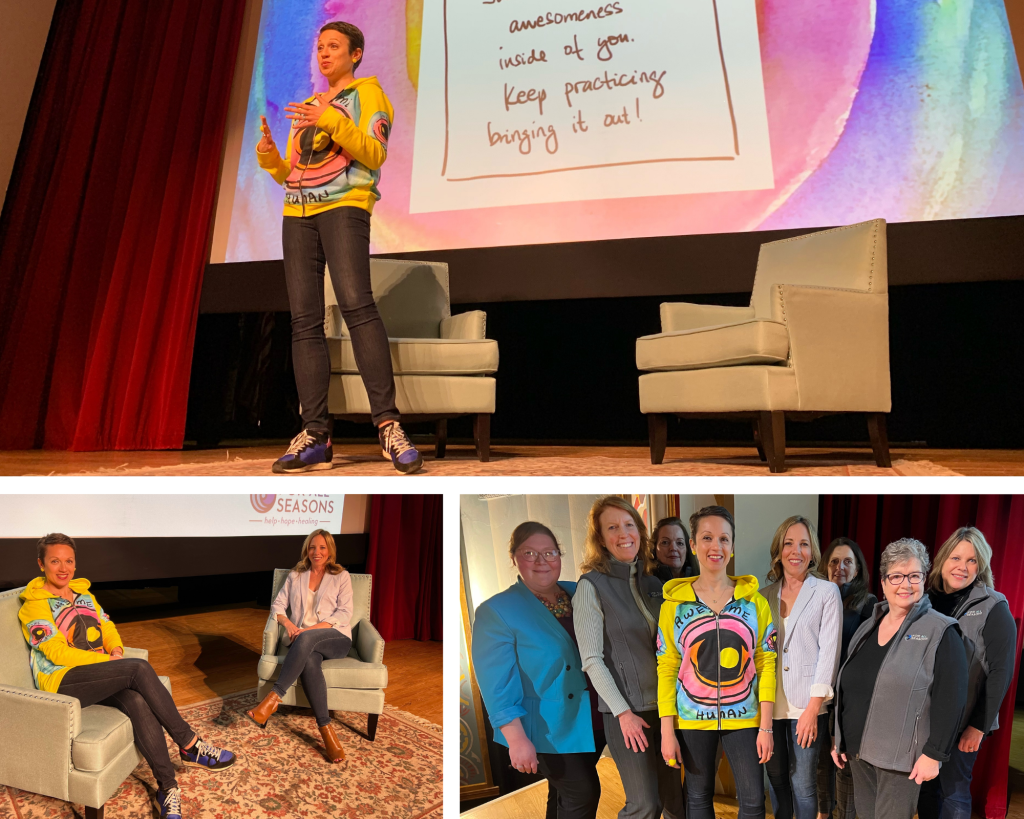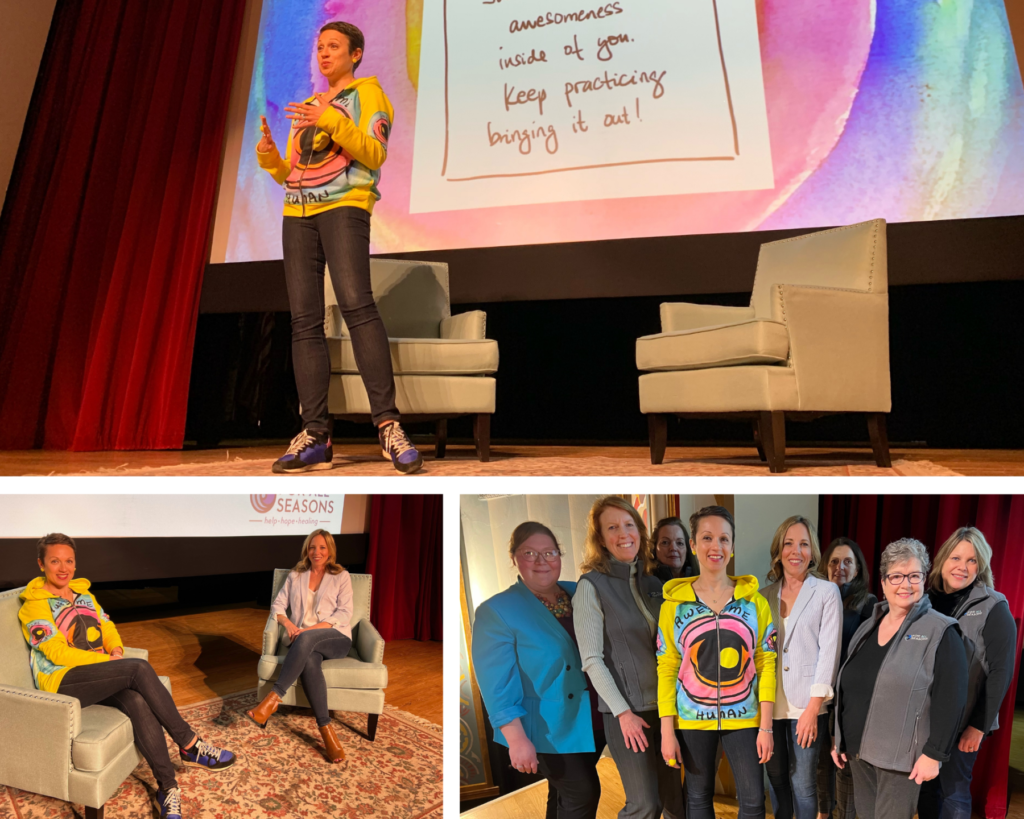In the News

Nataly Kogan Inspires Audiences to Tackle Emotional Burnout

#2: Nataly Kogan sharing tips about how to improve our mental health and emotional fitness.
#3: Nataly Kogan and Beth Anne Langrell answering audience questions.
Motivational speaker Nataly Kogan (natalykogan.com) provided For All Seasons audiences, at the Avalon Theatre and virtually, tips on maintaining emotional fitness at a time when stress and exhaustion are at an all-time high. She shared essential mindset shifts, scientific research, and tangible skills to help participants realize their potential — with less stress and greater energy, joy, and a sense of meaning. Kogan has appeared in hundreds of media outlets, including The New York Times, The Washington Post, and The Wall Street Journal.
In the newly released book, The Awesome Human Project, Kogan says that there is an awesome human inside every single one of us, with a great capacity to create a positive impact in the world. But, to embrace your “Awesome Human,” she says you need to strengthen your emotional fitness skills and break through the mental blocks that hold you back in every area of work and life.
After growing up in the former Soviet Union, Kogan came to the U.S. with her parents as a refugee when she was 13 and a half, after spending several months in refugee settlements in Europe. Kogan stated, “As you can imagine, that was a really tough experience. So, I tell you about this because that experience was so difficult, and there’s so much struggle that kind of cemented in me this idea that life is struggle.”
She reflected, “I kind of lived my life from the neck up. And I thought that eventually, I’ll get to this point where I’ve done enough. I don’t know what ‘enough’ meant, but I thought eventually, I’ll do enough, I’ll achieve enough, I’ll create enough, and then I’ll feel good.”
Kogan, founder and CEO of a company called Happier, eventually suffered debilitating burnout that left her feeling exhausted, overwhelmed, and experiencing self-doubt and anxiety. She explained, “The best way I can describe it, it was a breakdown of being. I just could not ‘be’ anymore. . . I was really scared and I was in a dark place. Sometimes the person doesn’t look like they’re struggling. I looked very shiny. I had people close to me who could recognize it. And if I had been honest with myself, I actually had been burning out daily for years.”
Signs of Kogan’s burnout included resenting the work that she really loved, feeling a sense of dread every day, feeling empty like she had nothing to give at the end of every day, and withdrawing from any social interaction, including with her family and friends. She ignored these feelings.
“I learned that it is not the way you’re supposed to be doing it. You are not here to struggle. You are here to live with a capital ’L’ and you’re here to thrive,” she added.
She used the story of sculptor Michelangelo and how he saw a piece of marble – with the sculpture already in it and his job as a sculptor was just to chisel away at it. She added, “And that is what I believe we’re all here to do. When you undertake your Awesome Human Project, and I think it’s a lifelong project, I think it’s the most important project of your life. That’s what we’re here to do. We’re here to chisel away at the stuff that is holding back, our inner sculpture, our truly inner awesome human.”
“I believe that there’s an awesome human inside every single one of you. Every single one of you has the capacity to be the force of good to create something meaningful in this life to truly bring your uniqueness into the world. But we’re also human, which means we need to take care of our energy. We need to take care of our mental health. And the only way that we get to share our awesomeness with the world is honoring the human in ourselves.”
Kogan shared the following lessons which helped in her own recovery from burnout:
Lesson #1: Life is hard, but we can learn how to have a better inner experience. When we struggle less, we have more energy, more of our intellectual, creative, analytical, more of our awesome human capacity to do the things we want to do.
Lesson #2: Taking charge of our emotional fitness is a skill we can improve through practice. When we improve our emotional fitness, we are improving our inner resilience for whatever challenges come our way. She challenged the audience to ask themselves, ‘How would you describe your relationship with yourself?’ as a starting point.
Lesson #3: Small shifts, small steps, small improvements in how we treat ourselves in our relationship with our thoughts and our emotions have a huge impact, not just on our mental health or emotional fitness, but on our ability to be productive and creative and have better relationships.
Kogan also explained that our brain only cares about one thing – it wants to keep us safe. And because it wants to keep us safe, it is always looking out for possible danger, physical or psychological, and ignoring anything familiar and good. She advocated practicing gratitude and self-compassion to stay focused on what is good in our lives. Her tip is to always practice saying to ourselves, “What would I say to a friend?” to remain positive with ourselves.
“Taking care of your well-being can never be selfish. Because when you struggle less you help everyone around you to struggle less. When you take care of yourself, you have so much more to give to everyone around you. You cannot do greatness on empty. When you invest in your emotional fitness and when you honor your humanity, it allows you to bring out your awesome human and do all the meaningful, amazing things you want to do,” she concluded.
